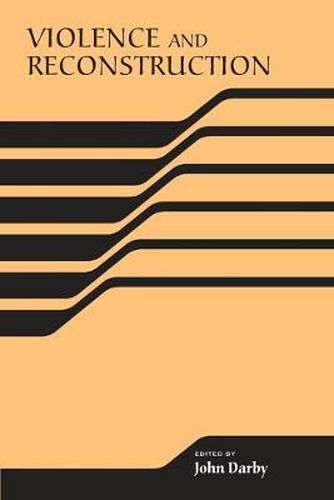Readings Newsletter
Become a Readings Member to make your shopping experience even easier.
Sign in or sign up for free!
You’re not far away from qualifying for FREE standard shipping within Australia
You’ve qualified for FREE standard shipping within Australia
The cart is loading…






This is the first book to focus on the effects of violence in internal conflicts after peace agreements have been signed. Since the mid-1990s many peace processes, including those in Israel-Palestine, Guatemala, El Salvador, and Northern Ireland, have reverted to violence while seeking to implement formal peace agreements. In all these cases the persistence and forms of violence have been among the main determinants of the success or failure of the peace process. Violence and Reconstruction adopts a four-part analysis, examining in turn violence emanating from the state, from militants, from destabilized societies, and from the challenge of implementing a range of policies including demobilization, disarmament, and policing. Leading scholars explore in detail each of these aspects of postwar violence. Their findings draw attention to the increased willingness of the state to turn to militias to carry on violence by proxy; to the importance of distinguishing between the aims and actions of different militant groups; to a postwar rise in violent conventional crime; and to the importance of the proper restoration of civil society.
$9.00 standard shipping within Australia
FREE standard shipping within Australia for orders over $100.00
Express & International shipping calculated at checkout
This is the first book to focus on the effects of violence in internal conflicts after peace agreements have been signed. Since the mid-1990s many peace processes, including those in Israel-Palestine, Guatemala, El Salvador, and Northern Ireland, have reverted to violence while seeking to implement formal peace agreements. In all these cases the persistence and forms of violence have been among the main determinants of the success or failure of the peace process. Violence and Reconstruction adopts a four-part analysis, examining in turn violence emanating from the state, from militants, from destabilized societies, and from the challenge of implementing a range of policies including demobilization, disarmament, and policing. Leading scholars explore in detail each of these aspects of postwar violence. Their findings draw attention to the increased willingness of the state to turn to militias to carry on violence by proxy; to the importance of distinguishing between the aims and actions of different militant groups; to a postwar rise in violent conventional crime; and to the importance of the proper restoration of civil society.